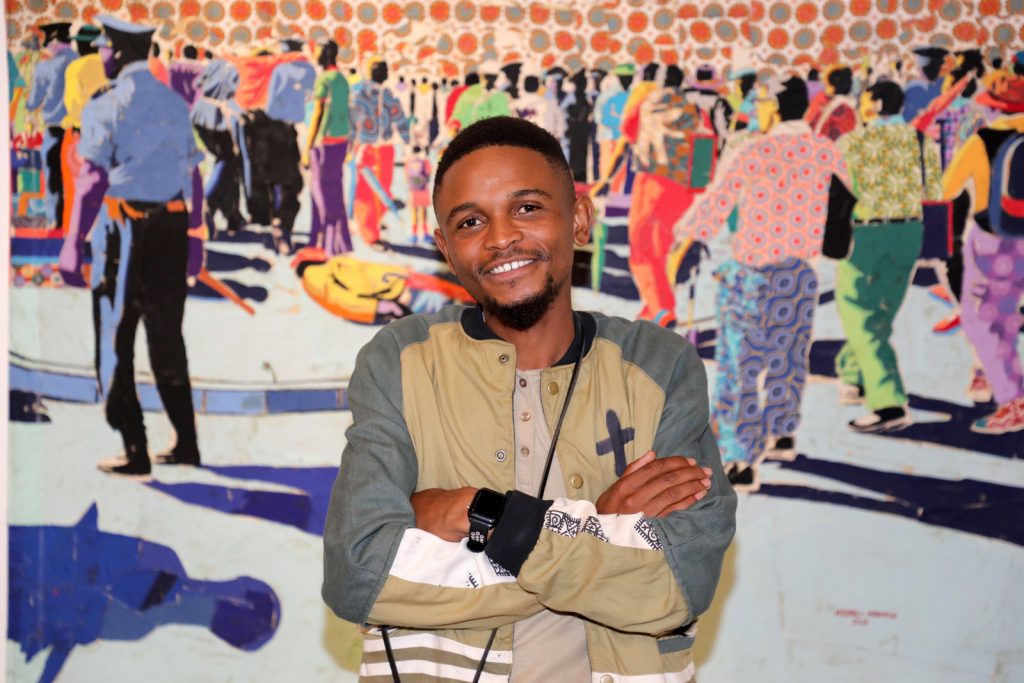Mbhela won for his artwork Iphasi nesiphesheli, which is part of the series titled Umlando uyaziphinda, meaning, “history repeats itself”. Photo: Supplied
Durban-born visual artist Mondli Mbhela believes in preparation — and using the passing time to constantly sharpen his skills. Mbhela, winner of the 2022 Sasol New Signatures art competition, spent years readying himself to enter.
Speaking during a telephonic interview, the light-hearted Mbhela explained that it took him at least seven years to prepare himself to enter the competition because he thought that he still needed time to sharpen his skills.
“I’ve always told myself that in order for me to be able to enter a competition of this magnitude, I have to be able to create work that [has] depth, technically and conceptually,” he explained. When he finally decided that he would enter, he spent four years preparing artworks he wanted to submit.
The New Signatures art competition was established by the Pretoria Arts Association in the late 1960s. It has been running for 32 years and Sasol is a key sponsor.
The competition is open to any South African artists over 18 who have not held a solo exhibition. Artists who have held a solo exhibition for academic purposes, such as a master’s degree exhibition, are allowed to enter. Artists can submit up to two artworks in any artistic medium.
Mbhela won for his artwork Iphasi nesiphesheli, which is part of the series titled Umlando uyaziphinda, meaning, “history repeats itself”. The message is that we can learn from our history and overcome its brutal lessons.
The subject of Iphasi nesiphesheli concerns police officers who are manning a crowd of people, who seem purposefully grouped together to rally against something. When you zoom in your gaze, you see a man’s body lying on the floor, while another injured man is being carried away from the crowd.
Against this immortalised sombre moment, characters in the painting are dressed in elaborate clothes — the colours of the motif draw in the viewer. From afar, the paintings’ illustrious colours are inviting, but when you further scan the work, you realise that it captures the remnants of a violent situation that just took place.
Mondli said the artwork and the series was inspired by historical South African events, as well as those that took place in his personal life.
He explained that he was inspired by the Sharpeville massacre, where on 21 March 1960 many in a crowd demonstrating against the pass laws were shot by police.
“In the piece, I was inspired by the events which took place in early 2020, where we were relegated to our homes in order to fight against an invisible virus, which took the lives of many,” explained Mbhele.
He said the restrictive measures which took place, such as being made to wear masks in order to enter public places like shops, were similar to the events which took place under the apartheid regime. He said back then, instead of masks, people needed pass books in order for them to have access to certain places.
 Durban-born visual artist Mondli Mbhela believes in preparation. Photo: Supplied
Durban-born visual artist Mondli Mbhela believes in preparation. Photo: Supplied
Mbhele explained that he took his time to apply for this prestigious competition because he recognised how important the platform is.
“I think entering a competition is one of the ways that open up opportunities for emerging artists to be able to have access to the art market and be exposed to other artists,” he explained. “It’s good for artists because you can grow … when you are there, you get to interact with different artists and you learn a lot from those around you,” he said.
Mbhele said that his artmaking process includes using collages to portray the themes he wants to explore. He further explained that he uses fabric as his medium of expression.
“Fabric is used to make garments for people of different age groups; so I also collect offcuts from factories around Durban,” he said. While collecting fabric, he realised that the offcuts share the same vulnerability because they were thrown away instead of being used to make a beautiful piece of clothing. “So I collect them in order [for the fabric] to share a new dialogue in my work,” explained Mbhele.
Mbhele said that from the time he was young, he was surrounded by creative people, from his grandmother who used to make pottery to other members of his family, most of whom were artists, he emphasised.
“I was exposed to art early in my life, and I’ve never looked back. It’s always been there as my friend and girlfriend,” said Mbhele, releasing a chuckle.
“For emerging artists, the challenge remains the same: breaking into a very competitive, ever-evolving field. Sasol is honoured to play a role in providing opportunities for emerging artists to showcase their work. This year we had an unprecedented number of entries, which reinforces the need for a platform such as this. It also highlights the depth of talent and creativity across South African society,” said Elton Fortuin, Sasol vice president of group communications and brand management.
As the winner, Mbhele walks away with a cash prize of R100 000 and an opportunity to have a solo exhibition at the Pretoria Art Museum next year.